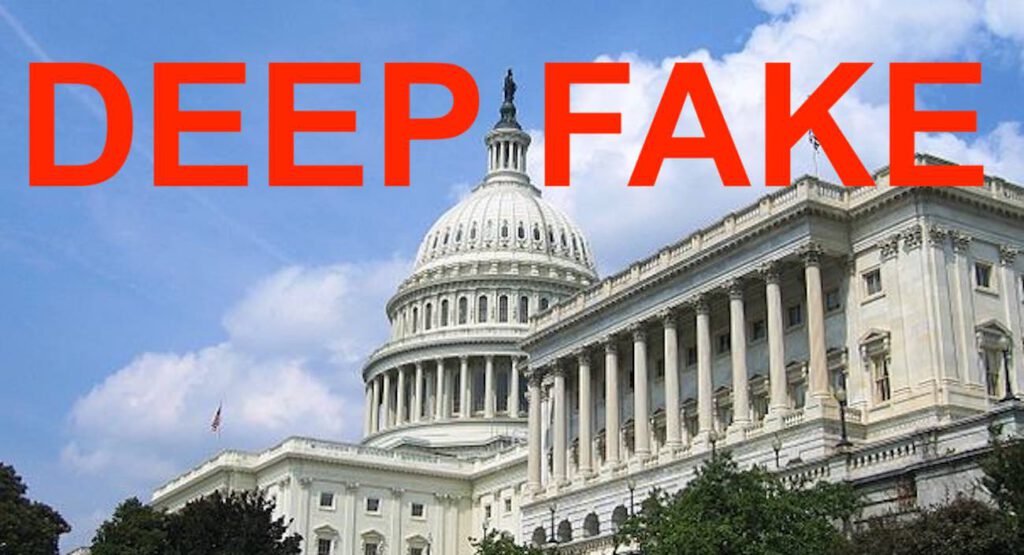The photo of the Capitol is by Martin Jacobsen and is CC licensed.
During the Democratic primary in January, thousands of voters received robocalls using artificial intelligence to impersonate President Biden and discourage them from voting.
The political consultants responsible now face millions of dollars in fines and prison time on 13 felony counts of voter suppression and 13 misdemeanor counts of impersonating a candidate.
To combat the emerging threat of AI deepfakes and misinformation in U.S. elections, a new Artificial Intelligence Task Force has brought together state and local elected officials to focus on ways to combat malicious AI-generated activity that threatens the democratic process.
Arizona Secretary of State Adrian Fontes, who doesn’t speak German, created a deepfake that is nearly indistinguishable from the real Fontes speaking — all to show how incredibly realistic and manipulative AI-generated content can be.
Fontes, along with Michigan Secretary of State Jocelyn Benson and Minnesota Secretary of State Steve Simon, are leading the fight to prepare their states’ election workers and voters to be vigilant and informed about AI threats.
They are part of a coalition of Secretaries of State working with a task force created by the NewDEAL Forum to develop tools and best practices to combat AI-driven disinformation this election season.
“In Michigan, we have enacted a law that makes it a crime to knowingly distribute materially deceptive AI-generated deepfakes if there is intent to harm a candidate’s reputation or electoral prospects,” Secretary of State Benson told Democracy Docket, a digital news platform founded by Marc Elias, an attorney who specializes in voting rights and elections in court.
A new law passed in November makes the crime a felony.
Great news on crime: US crime rate drops to ‘historic’ low as murder, rape and robbery plummet, new statistics show
“In addition, we are requiring any political ad created wholly or largely with the help of AI to include a statement that the ad was created by artificial intelligence. This disclaimer requirement will help equip the public with knowledge on how to be critical consumers.”
The key battleground states of Arizona and Michigan have developed tabletop exercises to train election officials to identify AI, work with police and emergency personnel to ensure security, and be prepared to quickly respond to any voting issues that may arise on or before Election Day, and to prevent any negative effects of AI from spreading. (Watch their interview in the video below…)
A NewDEAL Forum poll conducted in Arizona in April found that just 41% of respondents knew something about AI and elections.
“Generative AI presents both great opportunities and great challenges,” said New York State Assemblyman Alex Bolles, co-chair of the NewDEAL Forum AI Task Force and one of the few state legislators with a background in computer science. “Our goal is to develop policies that harness the potential of AI to improve public services, while proactively preparing for the threats and unforeseen challenges that AI poses to our democratic institutions.”
In March, they released a report outlining best practices for election officials, from secretaries of state to county election staff, to mitigate the negative effects of AI in elections. Their advice also includes more short-term practices, like public information campaigns about the threats and procedures for responding quickly when threats arise.
Voting Rights Victory: Supreme Court’s Two Conservatives Issue Historic Decision Protecting Voting Rights in Alabama Redistricting Case
The document also proposes legislation that state politicians can pass to protect democracy from AI threats.
According to Democracy Docket, at least 40 states have introduced bills to regulate the use of AI, but only 18 have laws that specifically address AI in the context of elections. And thankfully, Michigan is one of them.
Watch Fontes and Benson debate on Democracy Docket… (Subscribe to get the latest updates on election court cases from around the U.S.)
Please help us spread awareness by sharing the news on social media…

